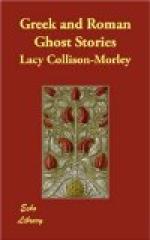Great battlefields are everywhere believed to be haunted. Tacitus[34] relates how, when Titus was besieging Jerusalem, armies were seen fighting in the sky; and at a much later date, after a great battle against Attila and the Huns, under the walls of Rome, the ghosts of the dead fought for three days and three nights, and the clash of their arms was distinctly heard.[35] Marathon is no exception to the rule. Pausanias[36] says that any night you may hear horses neighing and men fighting there. To go on purpose to see the sight never brought good to any man; but with him who unwittingly lights upon it the spirits are not angry. He adds that the people of Marathon worship the men who fell in the battle as heroes; and who could be more worthy of such honour than they? The battle itself was not without its marvellous side. Epizelus, the Athenian, used to relate how a huge hoplite, whose beard over-shadowed all his shield, stood over against him in the thick of the fight. The apparition passed him by and killed the man next him, but Epizelus came out of the battle blind, and remained so for the rest of his life.[37] Plutarch[38] also relates of a place in Boeotia where a battle had been fought, that there is a stream running by, and that people imagine that they hear panting horses in the roaring waters.
But the strangest account of the habitual haunting of great battlefields is to be found in Philostratus’s Heroica, which represents the spirits of the Homeric heroes as still closely connected with Troy and its neighbourhood. How far the stories are based on local tradition it is impossible to say; they are told by a vine-dresser, who declares that he lives under the protection of Protesilaus. At one time he was in danger of being violently ousted from all his property, when the ghost of Protesilaus appeared to the would-be despoiler in a vision, and struck him blind. The great man was so terrified at this event that he carried his depredations no further; and the vine-dresser has since continued to cultivate what remained of his property under the protection of the hero, with whom he lives on most intimate terms. Protesilaus often appears to him while he is at work and has long talks with him, and he keeps off wild beasts and disease from the land.
Not only Protesilaus, but also his men, and, in fact, virtually all of the “giants of the mighty bone and bold emprise” who fought round Troy, can be seen on the plain at night, clad like warriors, with nodding plumes. The inhabitants are keenly interested in these apparitions, and well they may be, as so much depends upon them. If the heroes are covered with dust, a drought is impending; if with sweat, they foreshadow rain. Blood upon their arms means a plague; but if they show themselves without any distinguishing mark, all will be well.
Though the heroes are dead, they cannot be insulted with impunity. Ajax was popularly believed, owing to the form taken by his madness, to be especially responsible for any misfortune that might befall flocks and herds. On one occasion some shepherds, who had had bad luck with their cattle, surrounded his tomb and abused him, bringing up all the weak points in his earthly career recorded by Homer. At last they went too far for his patience, and a terrible voice was heard in the tomb and the clash of armour. The offenders fled in terror, but came to no harm.




